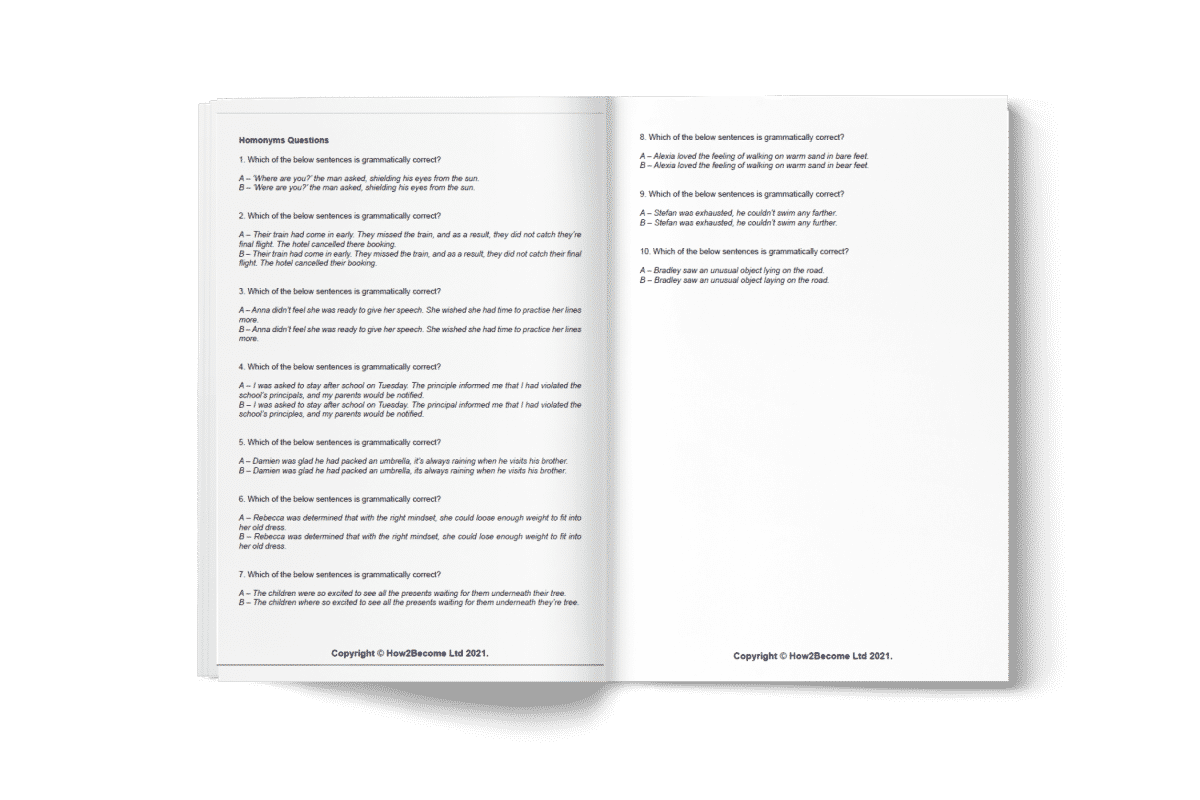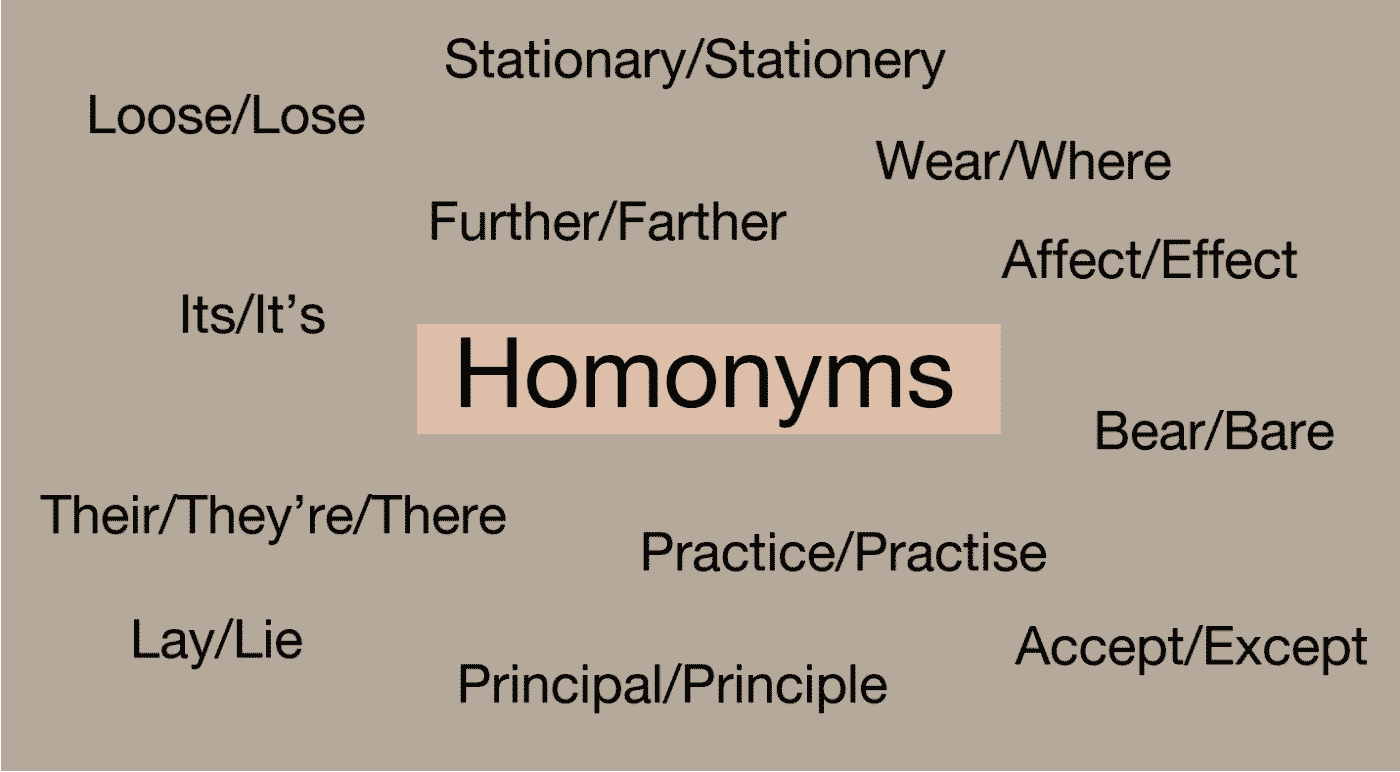What is a homonym? Homonyms are words which are spelt or pronounced the same, but have different meanings. Nobody’s perfect, and at some point in their life almost everyone has got two or more words mixed up. Here’s a few homonym examples which are most commonly mixed-up.
Homonyms: Loose vs Lose
Lose means ‘to be deprived of something’ or ‘failing to retain’. Lose is the opposite of win.
Loose means ‘not firmly or tightly fixed in place.’ Loose is the opposite of tight.
The confusion/mistake here comes from the double o sound/spelling.
Homonyms: Accept vs Except
To accept something means ‘to receive’ or ‘recognise as correct’. Accept is the opposite of reject.
Except means ‘not including’, and is a way of specifying something as different from the rest of a group.
Homonyms: Its vs It’s
‘Its’ is the possessive form of ‘it’, and must be used accordingly. For example:
‘My budgie can no longer fly, as it has damaged its wing.’
‘It’s’ is a contraction of ‘it is’. Therefore, it would make no sense to use ‘it’s’ in the above sentence, or it would read as follows:
‘My budgie can no longer fly, as it has damaged it is wing.’
If you ever have any confusion over whether to use ‘its’ or ‘it’s’ then try writing out the contracted version in full. If it doesn’t read right, you have your answer.
Homonyms: Further vs Farther
This is an easy one to get mixed up. The best way to recognise the difference between farther and further, is to remember that ‘farther’ is used in reference to a measurable distance:
‘This walk is so long. How much farther do we need to go?’
In contrast, ‘further’ is used in reference to an immeasurable distance or amount of time:
‘I am fed up. I refuse to talk about this any further.’
Homonyms: Lay vs Lie
This is a really tricky one. In essence, the difference between the two words is that lay must always be accompanied by an object. Lay is a verb. For example:
‘Paul was waiting patiently for his chicken to lay her first egg.’
In contrast, ‘lie’ is the word ‘reclining’, and should be used thusly:
‘After a long day at work, all Michael wanted to do was lie down on his bed.’
Homonyms: Principal vs Principle
These are two very commonly confused words, but mean very different things.
‘Principal’ is another word for ‘main’. You would also use this when referring to an educational authority:
‘My principal concern is for the welfare of the children.’
‘The principal’s main concern was for the welfare of the children.’
‘Principle’, on the other hand, refers to an idea or value. For example, you might say that someone has strong ‘principles’.
‘I believe in the principle of justice.’
Homonyms: Their vs They’re vs There
These three terms are commonly misused. The correct usage for them is as follows:
‘Their’ is used to demonstrate possession, 99% of the time for more than one person. For example:
‘The new staff were performing well. Their bonuses this month will reflect this.’
‘Their’ can also be used as a possessive singular. For example:
‘Can somebody find out who the owner of the car is? Tell them their vehicle is being towed!’
‘There’ is used to indicate place, or the existence of something. This is very simple and easy to use:
‘There is a fly in my soup.’
‘There is no chance that you will be on time for the flight.’
‘Sign the contract, right there. Thank you, it’s been a pleasure.’
Finally, we have ‘they’re’. This is a contraction of ‘they are’, and is used thusly:
‘They’re going to have a wonderful holiday, the weather forecast looks good.’
‘They’re very early, the party doesn’t start for another hour.’
Homonyms: Wear vs Where
Wear and where are easy to mix up, but have very different meanings.
‘Wear’ is used in reference to clothing. It can also be used in reference to erosion or damage:
‘Today I will wear my boots, as it is muddy.’
‘His strategy was simple – wear down the opponent, before striking.’
‘Where’, on the other hand, is used to indicate place. For example:
‘I know where I am going, but do you?
‘Where are you? I will find you, and then we can walk to the restaurant.’
Homonyms: Practice vs Practise
The best and easiest way to remember the difference between these two is that ‘practise’ is a verb, and ‘practice’ is a noun.
So, to use the word ‘practise’, the subject of the sentence has to be actually taking action. You would use this to refer to the repetitive action of doing something many times over, with the aim of mastering it.
For example:
‘I practise my football skills, twice daily.’
‘I am a keen juggler, and practise three times a day.’
The word ‘practice’ is a noun, and refers to either a tradition or custom, or in reference to professional capacity. For example:
‘Margot is very skilled in the practice of law.’
‘I am visiting the medical practice on Wednesday, for an evaluation of my spinal cord.’
Homonyms: Affect vs Effect
Another complex one, this often gets people in a muddle. The simplest way to remember it is this:
‘Affect’ is used a verb. When using this in sentence, remember that something or someone must instigate the ‘affect’. They must ‘affect’ something or someone else. For example:
‘Samuel’s being rude affected Neil’s mood.’
In this case, Samuel’s behaviour did the affecting, to Neil’s mood.‘Effect’, on the other hand, is used as a noun. For example:
‘The stress of it all had a severe effect on my sleep.’
It’s worth noting that, if you do ever find yourself confused, you can often substitute the word ‘impact’ to cover both bases:
‘The essay deadline had a significant impact upon my health.’
‘His rudeness impacted my mood.’
This won’t always work, but it’s a safe and reliable alternative most of the time.
Homonyms: Bear vs Bare
These two words are easily mixed up, and it’s very common to see them being used in the wrong way. The way they should be used, is as follows:
‘Bear’ along with being a large and furry animal, means ‘to carry’ or ‘support’. The problem most people have when using these two words, is when using the expression: ‘I can’t bear it.’ Bear is the correct spelling here, as in this context, you are ‘carrying’ the pain or load with you.
The term ‘bare’, on the other hand, is used in reference to either exposing something, or a lack of something. For example:
‘He was bare, naked as the day he was born.’
‘The room had nothing in it. It was completely bare.’
‘He bared his wound to the nurse for examination.’
Homonyms: Stationary vs Stationery
The final two words on our list have just one letter that’s different, and this leads to lots of confusion for people.
‘Stationary’ refers to an object/person that is fixed or immobile. For example:
‘The car came to a halt. It was stationary.’
‘The spike was fixed in the ground, stationary, as a permanent reminder of what would happen to those who misbehaved.’
‘Stationery’ on the other hand, refers to objects such as pens, paper, and other writing utensils:
‘I went to the shop to purchase some stationery.’
‘The students were warned that school stationery was not to be used as a weapon.’
A simple trick you might find easy to remember this is:
- The cAr was stationAry
- The pEn completed my stationEry set.
DOWNLOAD 10 PRACTICE QUESTIONS AND ANSWERS TO TEST YOUR UNDERSTANDING OF HOMONYMS!


